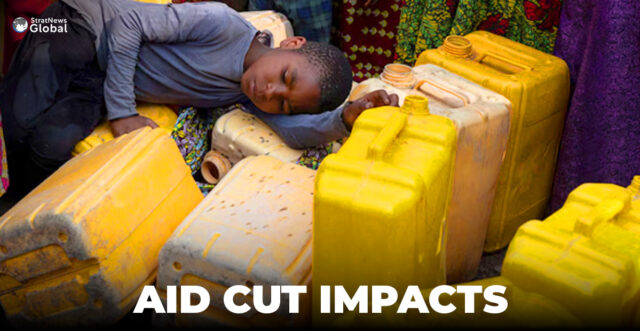The Trump administration’s sweeping cuts to U.S. foreign aid have left numerous global water and sanitation projects unfinished, posing new risks to intended beneficiaries, Reuters has found.
Reuters has identified 21 unfinished projects in 16 countries after speaking to 17 sources familiar with the infrastructure plans. Most of these projects have not previously been reported.
With hundreds of millions of dollars in funding cancelled since January, workers have put down their shovels and left holes half-dug and building supplies unguarded, according to interviews with U.S. and local officials and internal documents seen by Reuters.
As a result, millions of people who were promised clean drinking water and reliable sanitation facilities by the United States have been left to fend for themselves.
Water towers intended to serve schools and health clinics in Mali have been abandoned, according to two U.S. officials who spoke on condition of anonymity.
In Nepal, construction was halted on more than 100 drinking water systems, leaving plumbing supplies and 6,500 bags of cement in local communities. The Himalayan nation will use its own funds to finish the job, according to the country’s water minister, Pradeep Yadav.
In Lebanon, a project to provide cheap solar power to water utilities was scrapped, costing some 70 people their jobs and halting plans to improve regional services. The utilities are now relying on diesel and other sources to power their services, said Suzy Hoayek, an adviser to Lebanon’s energy ministry.
In Kenya, residents of Taita Taveta County say they are now more vulnerable to flooding than they had been before, as half-finished irrigation canals could collapse and sweep away crops. Community leaders say it will cost $2,000 to lower the risk – twice the average annual income in the area.
“I have no protection from the flooding that the canal will now cause; the floods will definitely get worse,” said farmer Mary Kibachia, 74.
Bipartisan Support
Trump’s dismantling of the U.S. Agency for International Development has left life-saving food and medical aid rotting in warehouses and thrown humanitarian efforts around the world into turmoil. The cuts may cause an additional 14 million deaths by 2030, according to research published in The Lancet medical journal.
The Trump administration and its supporters argue that the United States should spend its money to benefit Americans at home rather than sending it abroad, and say USAID had strayed from its original mission by funding projects like LGBT rights in Serbia.
With an annual budget of $450 million, the U.S. water projects accounted for a small fraction of the $61 billion in foreign aid distributed by the United States last year.
Before Trump’s reelection in November, the water projects had not been controversial in Washington. A 2014 law that doubled funding passed both chambers of Congress unanimously.
Advocates say the United States has, over the years, improved the lives of tens of millions of people by building pumps, irrigation canals, toilets and other water and sanitation projects. That means children are less likely to die of water-borne diseases like diarrhoea, girls are more likely to stay in school, and young men are less likely to be recruited by extremist groups, said John Oldfield, a consultant and lobbyist for water infrastructure projects.
“Do we want girls carrying water on their heads for their families? Or do you want them carrying school books?” he said.
The U.S. State Department, which has taken over foreign aid from USAID, did not respond to a request for comment about the impact of halting the water projects.
The agency has restored some funding for life-saving projects, but Secretary of State Marco Rubio has said American assistance will be more limited going forward.
At least one water project has been restarted. Funding for a $6 billion desalination plant in Jordan was restored after a diplomatic push by King Abdullah.
But funding has not resumed for projects in other countries, including Ethiopia, Tanzania, and the Democratic Republic of the Congo, say people familiar with those programs who spoke on condition of anonymity.
That means women in those areas will have to walk for hours to collect unsafe water, children will face increased disease risk, and health facilities will be shuttered, said Tjada D’Oyen McKenna, CEO of Mercy Corps, a nonprofit that worked with USAID on water projects in Congo, Nigeria and Afghanistan that were intended to benefit 1.7 million people.
“This isn’t just the loss of aid — it’s the unravelling of progress, stability, and human dignity,” she said.
(With inputs from Reuters)





